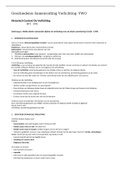Samenvatting
Summary Social and institutional change
These summary notes provide a streamlined and accessible overview of the key themes and discussions from the Sociology of Social and Institutional Change course. They outline major sociological theories and concepts that explain societal transformations, such as globalization, technological advance...
[Meer zien]





